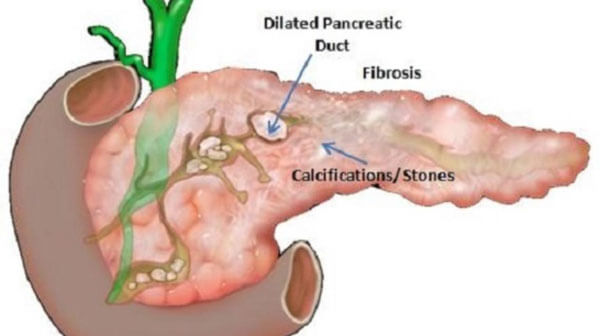Chronic pancreatitis usually is a result of regular alcohol intake for a long duration or genetic abnormality. Chronic pancreatitis leads to diabetes and loose stools (steatorrhea) due to inadequate fat digestion. A CT scan or MRI scan (Magnetic resonance cholangiopancreatography – MRCP) is often required to assess the extent of the damage. Pancreatic duct develops strictures (narrowing) at single or multiple places. Pancreatic stones may be located inside the duct as well as parenchyma (functional tissue). Adjacent organs can also get affected as its sequelae. If the splenic vein (blood vessel which carries the blood from spleen to liver) gets blocked, patients develop enlargement of the spleen and dilated blood vessels near the upper part of the stomach (gastric fundal varices). This condition is called left-sided portal hypertension. If the bile duct gets blocked, patients develop jaundice. If the duodenum (first part of the small intestine) gets blocked, patients develop vomiting. Sometimes patients develop inflammatory (non-cancerous) mass near the head of pancreas. This often poses a diagnostic dilemma as it is difficult to differentiate this from pancreatic cancers. Endoscopic ultrasound evaluation along with biopsy may help to confirm the diagnosis.



Chronic pancreatitis changes cannot be reversed. Treatment is aimed at relieving the symptoms and associated complications. Surgery is required if other less invasive options not working. Removal or clearance of pancreatic stones may not cure the symptoms in all, unlike gallbladder or kidney stones.



Our gastroenterology services treat all kinds of digestive system disorders. Book an appointment now with our GI Specialists and have the best team of doctors treating you!